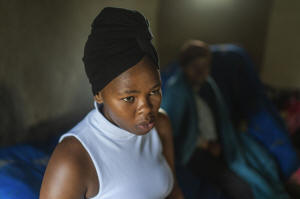South Africa says Trump's aid cuts stripped more than 8,000 health
workers from its HIV program
[May 16, 2025]
By MICHELLE GUMEDE
JOHANNESBURG (AP) — The Trump administration's dismantling of USAID has
put more than 8,000 health workers in South Africa's national HIV
program out of work, the country's health minister said Thursday, as he
outlined the impact of U.S. funding cuts on the biggest AIDS treatment
project in the world.
The cuts have also closed down 12 specialized HIV clinics that were run
by non-governmental organizations in South Africa and funded by the
United States Agency for International Development through the U.S.
President's Emergency Plan for AIDS Relief, Health Minister Aaron
Motsoaledi told reporters.
He said health authorities are now registering the more than 60,000
patients who were served by those clinics at state health facilities to
continue their life-saving treatment.
South Africa has nearly six million people on HIV medication, more than
any other country in the world.
The clinics that were defunded by the U.S. were largely treating what
are known as “key populations,” Motsoaledi said. They include gay men
and sex workers who are considered at higher risk of HIV infection and
who sometimes face stigma at public health facilities.
Motsoaledi said the Trump administration had terminated around $436
million annually in funding for HIV treatment and prevention in South
Africa, which made up part of the $2.5 billion a year program. The South
African government and other donors fund the rest.
Viral load testing — which measures how much the HIV virus is present in
the blood of patients on treatment — had decreased by 21% since the aid
cuts began to take effect in February, the health minister said. He
didn’t give figures on how the testing program to find those who are HIV
positive had been affected.

Dr. Linda-Gail Bekker, the CEO of the at Desmond Tutu Health Foundation.
said medical professionals are deeply concerned about the possibility of
undoing the progress gained in HIV treatment and the loss of healthcare
worker jobs.
“We know these services have stopped and we are starting to see worrying
signs that testing rates are down and other early warning signs that
there are gaps," said Bekker. “It would be really helpful if the
ministry acknowledged the gaps created and articulated a plan to ensure
the gap will be filled at least partially."
HIV treatment and prevention is one of the areas that has been impacted
most by the termination of U.S. foreign aid, especially in sub-Sahara
Africa.
[to top of second column]
|

Nozuko Majola sits in her Umzimkhulu home,, Nov. 11, 2025 in South
Africa. Majola is one of millions of patients in South Africa
affected by U.S. President Donald Trump's global foreign aid freeze,
raising worries about HIV patients defaulting on treatment. (AP
Photo/Jerome Delay, file)
 The head of the United Nations AIDS
agency told The Associated Press in February that the number of new
HIV infections globally could jump more than six times by 2029
because of the funding cuts.
Motsoaledi denied South Africa's national program was on the brink
of collapse, but outlined significant problems like personnel
shortages, funding shortfalls, and the difficulties in locating HIV
positive persons that need to start treatment.
U.S. President Donald Trump’s move to terminate more than 90% of
foreign aid through the USAID agency has undermined a near 20-year
effort to stop HIV deaths in the country worst-hit by the disease.
U.S. funding has been critical for South Africa's efforts to stop
people dying of AIDS, largely through helping provide free
antiretroviral medication that stops the virus replicating in the
body.
“We must put it categorically clear that under no circumstances will
we allow this massive work performed over a period of more than a
decade and a half to collapse and go up in smoke because President
Trump has decided to do what he has done,” Motsoaledi said.
South Africa has around 7.7 million people living with HIV,
according to the U.N. AIDS agency. Not all of them are on treatment
despite it being free. South Africa has recently embarked on a drive
to get 1 million more people on treatment.
The 8,061 health workers who lost their jobs make up more than half
of the health workers funded by USAID through PEPFAR, Motsoaledi
said. He said South Africa still has more than 250,000 health
workers in the HIV program paid by the government and other donors.
While South Africa still has donors like the Global Fund providing
financial assistance for its HIV program, Motsoaledi said it was
lobbying other governments and aid agencies for assistance, but no
new funding had been secured.
All contents © copyright 2025 Associated Press. All rights reserved |